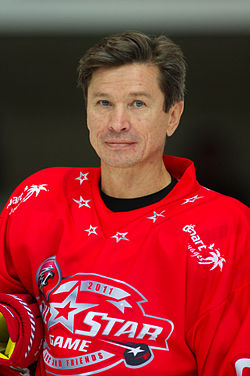 | |
| Most games | Andrei Khomutov (13) |
|---|---|
| Most points | Andrei Khomutov (17) |
| IIHF code | CIS |
| First international | |
| Austria (Feldkirch, Austria; 19 January 1992) Last international (Méribel, France; 23 February 1992) | |
| Biggest win | |
| France (Méribel, France; 14 February 1992) | |
| Biggest defeat | |
| Switzerland (Rapperswil, Switzerland; 4 February 1992) | |
| Olympics | |
| Appearances | 1 (first in 1992 ) |
| Medals | |
| International record (W–L–T) | |
| 11–2–0 | |
The CIS national ice hockey team was an ephemeral national ice hockey team that represented the Commonwealth of Independent States. [1] Essentially the former Soviet team under a different name, the CIS team existed in the few months between the dissolution of the Soviet Union and the formation of new ice hockey federations for the former Soviet states, now independent countries. Most notably, the team competed at the 1992 Winter Olympics as part of the Unified Team , winning the gold medal. However, the International Ice Hockey Federation would later attribute this gold medal to Russia as the successor state. [2] [3] The International Olympic Committee does not attribute that medal to Russia. [4] After the Olympics, the CIS team ceased to exist and was replaced by the Russian team. In the 13 games the CIS played, they won 11 and lost 2.

